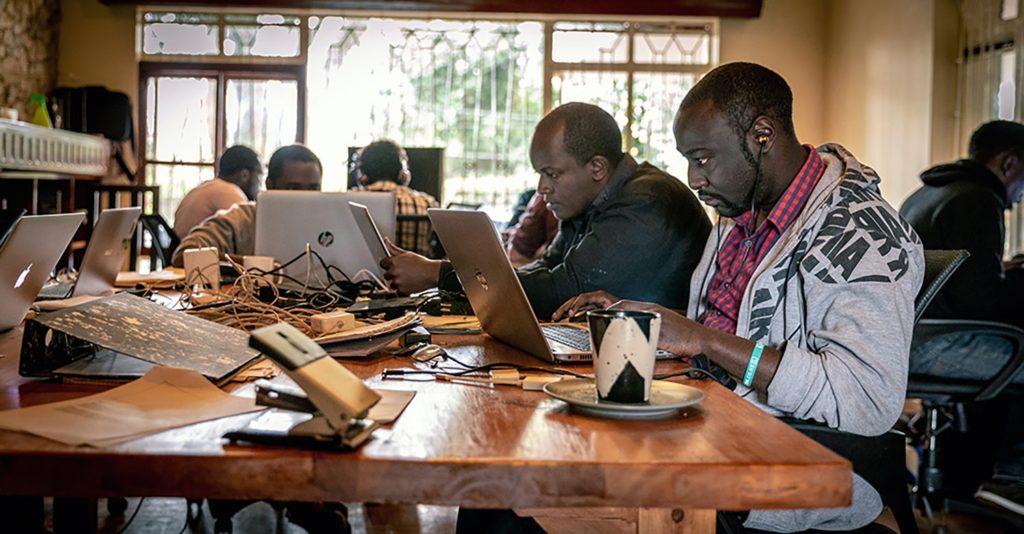There has been a lot of talk about resilience last year… of Africa, of the economies, the businesses. What is it actually?
States have in fact adopted only very small measures. There were many announcements, but followed by little effect, which some countries recognized at the end of the year: the billions announced to support the private sector were ultimately not disbursed. Ultimately, we remain with the usual problem of our countries, where between the announcement effects and the implementation, there is a gap.
In this context, the private sector cannot start and therefore be resilient. This is what makes me a little skeptical about this notion of resilience. Because there has been no structural transformation. When we go through these periods of crisis, where we observe that the world economies have closed down a little because of the health crisis, it is precisely the moment to look, in African countries, at the structural reforms to be undertaken in order to be less dependent on these international economies. There has not been, and regrettably, a strategy to benefit from this crisis and diversify the economy. The reforms underway take time, of course, but more than ever it was time to invest in certain local sectors where we will create a ripple effect in terms of capacity and training. If in addition we support this process with social measures and support for entrepreneurs, we then begin to create local dynamics. I will be told that countries do not have the means to support these transformations, but suddenly they should not make these announcements.
In short, let us be vigilant when we talk about resilience so as not to forget that 80-90% of the real economy are small players who suffer a lot on a daily basis.
There has also been a lot of talk about innovation: we have seen startups mobilize, providing very concrete solutions to the challenges posed by the health crisis. The question is whether this real economy will be able to integrate these new players and support them towards greater resilience?

Indeed, several sectors will experience faster changes due to this crisis. Catering, for example, one of the most affected, must develop an alternative delivery model and therefore customer-proximity, use the digital platform to reach the customer... That said, structural transformations are generally slow, when we try to apply them in the most affected sectors, especially agro-business, services, mass distribution...
This could be an opportunity if the public authorities provide support to these startups, through funding mechanisms, otherwise we will limit ourselves to one or two experiences but without transforming an entire continent. In addition, it means developing logistics chains much more. Because the transport of goods involves physical flows. We must invest in the logistics sector. If we look at the Gafa, who are doing well during this crisis, Amazon, for example, is at the heart of this new economy. If we cannot support the transport logistics industry which facilitates the use of digital platforms, we will have a missing link in the chain.
In the meantime, let's look into the future. Knowing that 80% of current professions will disappear over the next twenty years, especially with the arrival of AI, are our countries preparing for this new situation, in terms of training in particular? Do the sectors exist, apart from the few Coding schools, set up here and there?
In Africa, we need millions of coders, young computer scientists who will process data, make AI, who feed on Data. We have to have these data centers. Data is the wealth of the future. We must take these young people and train them to absorb these new jobs. If tomorrow in Rwanda, 100,000 young people are trained in AI professions, they will find jobs immediately. Because large international companies need human resources. We must anticipate this dynamic and revisit the education system in the light of these new realities. We are starting to see in our countries, universities, in Dakar, Lomé, and elsewhere, Fablabs that are starting to set up and that have also met needs during the Covid, by manufacturing respirators. It's still artisanal, but now that it has the merit of existing, we can accelerate it and take advantage of what is being done to create momentum.
However, to develop a digital economy, you have to build an entire ecosystem. Creating a coding school does not answer the problem, even if there are some encouraging examples, Rwanda, Kenya, Nigeria, Senegal, Morocco and perhaps Tunisia which had started well, but the crisis complicated matters. In Rwanda, for example, we've been working there for more than fifteen years, and it's not Silicon Valley. This requires significant investments. And it takes industry participation. If you don't have Facebook, Google, Amazon, Twitter, etc. it will be difficult to develop an ecosystem with training centers and the schools that go with them. Maybe in Cape Town, we can create this Silicon Valley, do that with the University of Cape Town, and we see it, young people are already approached by Facebook and Google.

However, if we do not see industries, which can use digital technology and drive the digital revolution, to establish themselves in our countries, this will not work. Because these training centers, these sectors must be done in collaboration with these industries. Second, we need to invest heavily in infrastructure to facilitate data processing for industry. Countries are trying to do this, but for that people must have access to the internet. When we want to have Data, we will see that the infrastructures do not follow. Third, the ecosystem in which these startups will operate cannot develop without venture capitalists who invest money to support the industrial development of startups. And this, with billions of dollars. You can't play with just 10 million.
Without playing the devil's advocate, these billions that you are talking about, the states do not have them, neither today. Where to find them and how to mobilize these funds?
It’s a matter of priority. If the state says the priority is agriculture, it is investing heavily in agriculture, the same if it is tourism, or port activities, or data production. It is a matter of strategic and sectoral development priorities. The problem, as everything is a priority and important, we sprinkle in all sectors. Which has no impact. So the first step is to make sure that the sector where you want to invest is a strategic and sector priority. The second step is to allocate sufficient domestic resources, but also to seek external resources. In other words, if we consider that digital is a priority and requires a billion or two investment, not less under penalty of cannot play in the Game, then it is up to the State to set up a vehicle, and to say: "we, the State, we take a part of the risk because we believe in it, and we put 50% in this vehicle" and we will seek institutional investors, private, who feed this fund , the management of which is entrusted to a professional in the field, whose job is to manage it as a real project. We then begin to build this ecosystem with the appropriate means. With of course the training centers that go with it.
In the meantime, another pan-African ecosystem is taking shape, the Continental Free Trade Zone (AfCFTA). What opportunities for digital companies? And are these companies ready to benefit?
I think they are. Companies are always ready in reality. A company that is active is always ready to seize new opportunities. What are the incentives in place, however? That’s the question. We are creating the space to facilitate the development of intra-African trade, which is a good thing, but we have to make sure that it works. Cross the road from Nigeria to Ghana and you will see the number of checks and hassles that exist. It actually has to work. And then, that we can stimulate industrial, economic partnerships so that companies can scale up. The Dangote exist, but not enough. If companies are to benefit from the AfCFTA, they must scale up and, for that, must be able to access new markets, and therefore to finance.

As the structure of our economy is 90% made up of SMEs, the majority of which are very small businesses, they will not be able to conquer these markets. If we allow these companies to come together, through joint-ventures or consortia, we will start to build champions who will be able to compete with large international companies. That's the risk, these international companies have the size, the capacity to go out and conquer these markets. Suddenly, African companies risk losing these opportunities not because they don't want to - in Africa, we have super entrepreneurs! - but because they do not have the instruments. So, if with the ZLECAf we manage to put in place these instruments, encourage joint ventures, they will be able to benefit from them. States can say, for example, that to stimulate the AfCFTA and promote the private sector each country will allocate 20% of its public market to companies that have a regional dimension, or get together to go to the regional market. There, we will start to have a structural transformation of the private sector.
For digital companies, on the other hand, for now, they don't have much to expect from AfCFTA. If a Senegalese start-up wants to go to Nairobi, he goes. On the other hand, if the ZLECAf says: "because he is a digital entrepreneur, if he wants to settle in Nairobi, he does not need a resident card" and thus, the ZLECAf gives him a facility. But ZLECAf will not give him the necessary funds. But if the ZLECAf says, we will identify 400 hubs for the continent, with a 50% discount for example on taxes for a young African entrepreneur who settles in this hub, then the ZLECAf provides an answer.





